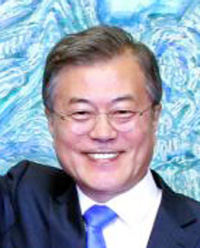
AP, Seoul :
To his supporters, South Korean President Moon Jae-in is a master negotiator who’s fixing decades of bad nuclear diplomacy with North Korea. To his critics, he’s falling prey to the same old trap that has claimed previous South Korean presidents – but with an important difference: This time the stakes are much higher.
Whoever’s right, it’s hard to ignore Moon’s role as the architect behind a new global push to settle the nuclear standoff with the North. The outcome of his efforts may hinge on a meeting in Singapore next month between North Korean leader Kim Jong Un and President Donald Trump, who spent months contemplating military strikes against the North before Moon steered him to the table.
Moon, a soft-spoken liberal, last month hosted Kim in a summit that saw them stride hand-in-hand across the border and pledge the “complete denuclearization” of the Korean Peninsula, an ambitious declaration that was light on specifics.
Moon doesn’t have the power to resolve North Korea’s weapons programs on his own. But in hustling between Pyongyang and Washington to set up the Kim-Trump summit and offering to broker other meetings with Pyongyang, Moon is fulfilling his promise to push South Korea into the driver’s seat in diplomacy with the North.
“South Korea has never had a leader like Moon, who actively embraced a leading role in planning and coordinating a global approach to the North,” said Hong Min, a senior analyst at Seoul’s Korea Institute for National Unification. “He managed to convince Washington that Pyongyang would change course after a year of brinkmanship. He convinced Pyongyang he would be able to move Washington.”
Despite the dangers – a derailed Trump-Kim summit might revive the animosity that enveloped the peninsula last year – Moon’s push has proven wildly popular: A Gallup Korea poll last week measured his approval rating at 83 percent, a striking number in a country deeply divided along ideological and generational lines.
To his supporters, South Korean President Moon Jae-in is a master negotiator who’s fixing decades of bad nuclear diplomacy with North Korea. To his critics, he’s falling prey to the same old trap that has claimed previous South Korean presidents – but with an important difference: This time the stakes are much higher.
Whoever’s right, it’s hard to ignore Moon’s role as the architect behind a new global push to settle the nuclear standoff with the North. The outcome of his efforts may hinge on a meeting in Singapore next month between North Korean leader Kim Jong Un and President Donald Trump, who spent months contemplating military strikes against the North before Moon steered him to the table.
Moon, a soft-spoken liberal, last month hosted Kim in a summit that saw them stride hand-in-hand across the border and pledge the “complete denuclearization” of the Korean Peninsula, an ambitious declaration that was light on specifics.
Moon doesn’t have the power to resolve North Korea’s weapons programs on his own. But in hustling between Pyongyang and Washington to set up the Kim-Trump summit and offering to broker other meetings with Pyongyang, Moon is fulfilling his promise to push South Korea into the driver’s seat in diplomacy with the North.
“South Korea has never had a leader like Moon, who actively embraced a leading role in planning and coordinating a global approach to the North,” said Hong Min, a senior analyst at Seoul’s Korea Institute for National Unification. “He managed to convince Washington that Pyongyang would change course after a year of brinkmanship. He convinced Pyongyang he would be able to move Washington.”
Despite the dangers – a derailed Trump-Kim summit might revive the animosity that enveloped the peninsula last year – Moon’s push has proven wildly popular: A Gallup Korea poll last week measured his approval rating at 83 percent, a striking number in a country deeply divided along ideological and generational lines.

